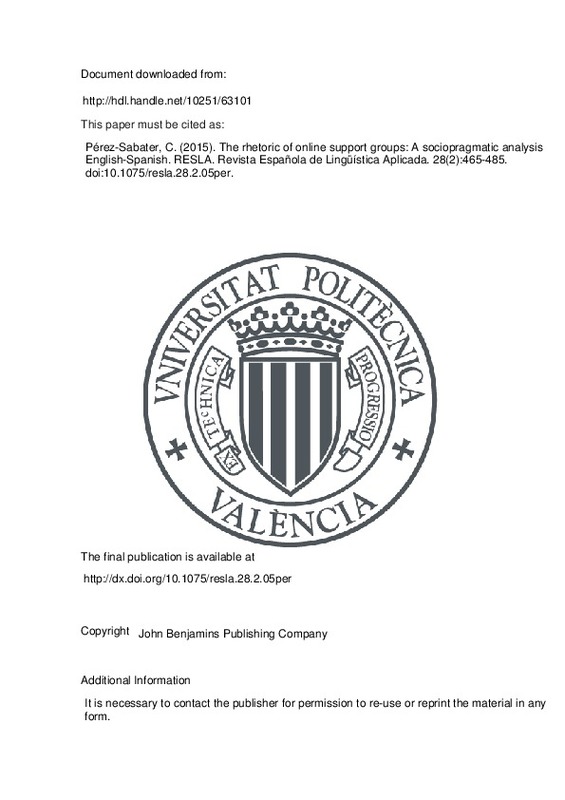|
Resumen:
|
[EN] The study draws on a diverse sample of adult users of online support groups to investigate how men and women engage in written conversations, and how these interactions are carried out in English and in Spanish ...[+]
[EN] The study draws on a diverse sample of adult users of online support groups to investigate how men and women engage in written conversations, and how these interactions are carried out in English and in Spanish contrastively. We will see to what extent female and male communicators in online support groups display similar power behaviours since some authors believe that these fora seem to provide a context where factors such as power and status are neutralised. In general, the detailed quantitative analysis suggests that women use powerless markers far more frequently than men. Therefore the findings support the contention that gender-based differences persist on the Internet, an arena which was initially believed to be free of built-in bias. On the other hand, the inter- and cross-cultural comparison indicates that the discourse practices in English include more powerless markers than those in Spanish. Interestingly, the abundant use of occurrences of formal addresses and polite forms displayed by men in Spanish may suggest that, in online support groups, men may be adopting communicative strategies traditionally associated with women s discourse.
[-]
[ES] El estudio se basa en una muestra diversa de usuarios adultos de grupos de ayuda online que sirve de base para investigar cómo hombres y mujeres entablan conversaciones escritas, y cómo estas interacciones se llevan ...[+]
[ES] El estudio se basa en una muestra diversa de usuarios adultos de grupos de ayuda online que sirve de base para investigar cómo hombres y mujeres entablan conversaciones escritas, y cómo estas interacciones se llevan a cabo en español e inglés contrastivamente. Veremos en qué medida las comunicaciones de hombres y mujeres presentan estrategias de poder similares, dado que algunos autores afirman que estos foros ofrecen un contexto en el que factores como el estatus y el poder están neutralizados. El análisis cuantitativo detallado del corpus sugiere que, en general, las mujeres usan estos marcadores de atenuación de poder mucho más frecuentemente que los hombres. Así pues, los resultados darían pie a afirmar que las diferencias de género existen en la comunicación por Internet, un campo que inicialmente estaba considerado libre de prejuicios de sexo. Por otra parte, el análisis intercultural indica que las prácticas discursivas en inglés incluyen más marcadores de atenuación que en español. Resultado sorprendente es el hecho de que en español los hombres utilizan muchos marcadores de cortesía, lo que podría indicar que hay ciertos indicios de que los hombres adoptan estrategias de comunicación tradicionalmente femeninas en grupos online de ayuda.
[-]
|







![[Cerrado]](/themes/UPV/images/candado.png)


